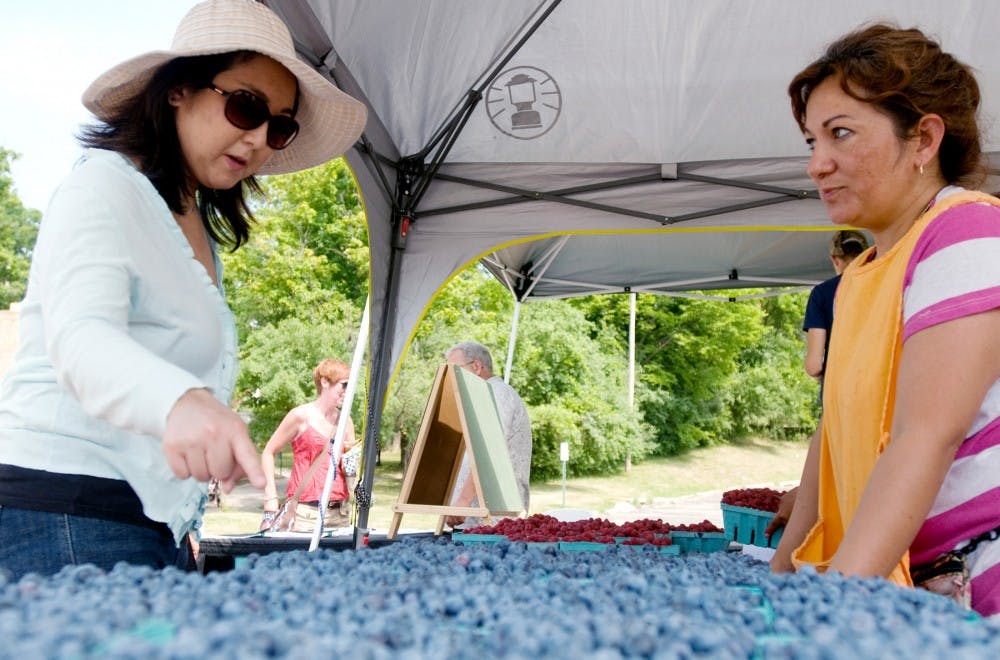Lansing resident Sean Dunham sat beneath a tree in Valley Court Park yesterday watching his son Barron, 3, practice twirling a hula hoop around his arm, stopping occasionally to grab a handful of fresh-picked blueberries from the carton his father just purchased.
Dunham, his wife Jennifer and their two children, Barron and Caroline, 17, spent the afternoon resting in the shade after a morning of shopping at the East Lansing Farmers Market, as they often do on Sundays during the summer.
“It’s always interesting to see what (the vendors) have in the stalls,” Sean Dunham said.
“We always enjoy the entertainment, and we really like the fact that they’ve got the playground here now and the activities for the kids.”
The East Lansing Farmers Market, which began the summer of 2009, opened for the season Sunday at Valley Court Park, 400 Hillside Court, and will continue every Sunday from 10 a.m. to 2 p.m. until October 30.
The market offers a variety of fresh fruits and vegetables, grass-fed beef, fresh fish, cheese and artisan bread — all grown or produced in Michigan.
East Lansing resident Heather Dubbs also spends her Sundays at the market with her family. Dubbs has visited the market every Sunday since it opened and always brings her mother.
“It’s a wonderful community experience,” Dubbs said. “It’s something I can do with (my mom) that isn’t a long walk and that she likes.”
Dubbs said she comes to the market for its variety of local food, and her mother usually picks out some fresh-cut flowers to decorate her assisted living apartment.
It is nice to get her out and spend time together, Dubbs said.
Keeping it local
The market is a growers-only market, meaning every item offered for sale has been grown or produced by the vendor selling it.
“It makes us unique,” Market Manager Michelle Carlson said. “It makes the food that you get fresher and more secure because you know where it’s coming from.”
Carlson hopes being a growers-only market will increase interaction between vendors and customers to create a community-like atmosphere.
“(Customers) benefit because they can talk to the farmer about how they grow their things, about where they grow it,” Carlson said.
Bill Lantzy, treasurer of Capital Area Local First, said he is happy to see the market supporting local business by selling only products from Michigan.
Capital Area Local First is a nonprofit organization working to encourage people to think local first when shopping.
“That’s great that (the market) can really take it to that level,” Lantzy said. “Shopping local really helps support the local economy, keeps money local; businesses support each other and, in turn, you also help provide jobs in the community.”
In addition to the economical benefits, shopping locally also can benefit community members by keeping their money in their community.
“When consumers spend their money with local providers, local businesses, a higher percentage of that money actually stays in the community,” Lisa Parker, vice president for Capital Area Local First, said.
A recent study by MSU’s Center for Community and Economic Development, in cooperation with Capital Area Local First, showed that for every $100 spent at a local business, $73 stays within the community.
Support student media!
Please consider donating to The State News and help fund the future of journalism.
In comparison, when $100 is spent at a nonlocal business, only $43 stays within the community.
“It sends money out of our communities when we’re not using local providers and we need money in our communities in order to generate jobs,” Parker said.
By shopping at East Lansing’s Farmers Market rather than a nearby supermarket, consumers are keeping their money within the East Lansing community and supporting farmers in the area.
Student support
After visiting the market several times last year, MSU graduate students Eric Wolf and Kazuko Fuchi decided to do more of their grocery shopping at the market this year, rather than at other supermarkets such as Meijer.
“They have superior food in terms of the taste,” Fuchi said. “So much better than the supermarket’s quality.”
In addition to the quality of products, Wolf and Fuchisaid they enjoy the market’s atmosphere and being able to talk with the vendors about what they are selling — something they said they can’t do at other supermarkets.
“(The vendors) are usually very knowledgeable about what they have,” Wolf said.
An abundance of MSU students at the market is not uncommon.
Carlson said students are a big part of the market’s customer base, partly due to its location near campus.
“Students that come that live off campus really love it because it’s sometimes hard for them to get to the grocery store, and it’s close by to MSU and to the neighborhoods that they live in,” Carlson said.
Even students who do not have a need for a lot of food, like those who live in the dorms, often come by the market just to check it out or get some flowers, she said.
Bringing it all together
In addition to providing customers with a place to purchase fresh food, learn about the food they purchase and interact with the people selling it — all while helping stimulate the local economy — the farmers market helps bring community members together.
“I think it’s just a good community event, and it gives residents who live in the city an opportunity to meet vendors who produce their own stuff,” Carlson said.
Mark Ebener has sold fresh fish at the market since it opened. He said the market’s homey feel and the opportunity to interact with customers makes it one of his favorite markets to work at.
He also mentioned the park’s location — in between several residential neighborhoods and the city’s commercial district — makes the market an ideal place for community members to gather.
“It’s as much a social event as it is people coming to buy food,” Ebener said.
Discussion
Share and discuss “Fresh Experience” on social media.





